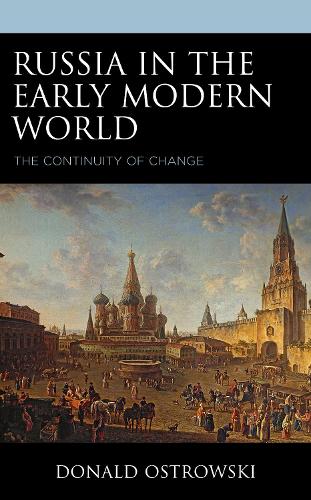
Russia in the Early Modern World: The Continuity of Change
(Hardback)
Publishing Details
Russia in the Early Modern World: The Continuity of Change
By (Author) Donald Ostrowski
Bloomsbury Publishing PLC
Lexington Books
25th January 2022
United States
Classifications
Professional and Scholarly
Non Fiction
947
Physical Properties
Hardback
574
Width 159mm, Height 228mm, Spine 36mm
943g
Description
A fundamental problem in studying early modern Russian history is determining Russias historical development in relationship to the rest of the world. The focus throughout this book is on the continuity of Russian policies during the early modern period (14501800) and that those policies coincided with those of other successful contemporary Eurasian polities. The continuities occurred in the midst of constant change, but neither one nor the other, continuities or changes alone, can account for Russias success. Instead, Russian rulers from Ivan III to Catherine II with their hub advisors managed to sustain a balance between the two. During the early modern period, these Russian rulers invited into the country foreign experts to facilitate the transfer of technology and know-how, mostly from Europe but also from Asia. In this respect, they were willing to look abroad for solutions to domestic problems. Russia looked westward for military weaponry and techniques at the same time it was expanding eastward into the Eurasian heartland. The ruling elite and by extension the entire ruling class worked in cooperation with the ruler to implement policies. The Church played an active role in supporting the government and in seeking to eliminate opposition to the government.
Reviews
Ostrowski has produced a major reconceptualization not only of Russian history in the early modern period, but of world history between the mid-fifteenth and close of the eighteenth centuries. This ambitious book starts with a challenge to a fundamental assumptionthat Peter the Greats reign constituted a fundamental, revolutionary break in Russian historyand develops a vast and convincing model of early modern Russian history as a continuous, if uneven, process of borrowing, growth, adaptation, and innovation that both fits the patterns in world history and singles out Russia as a distinct cultural matrix. It is the kind of book only someone with vast experience in primary sources and the secondary literature in multiple fields and disciplines could write, and highlights something we all already knewthat Ostrowski is one of the great masters of the craft of history working in our midst.
-- Russell E. Martin, Westminster CollegeAuthor Bio
Donald Ostrowski is distinguished lecturer in history at Harvard University.
